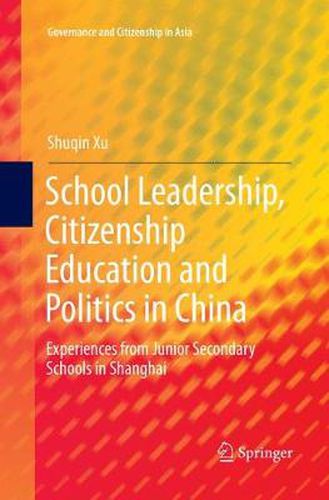Readings Newsletter
Become a Readings Member to make your shopping experience even easier.
Sign in or sign up for free!
You’re not far away from qualifying for FREE standard shipping within Australia
You’ve qualified for FREE standard shipping within Australia
The cart is loading…






This title is printed to order. This book may have been self-published. If so, we cannot guarantee the quality of the content. In the main most books will have gone through the editing process however some may not. We therefore suggest that you be aware of this before ordering this book. If in doubt check either the author or publisher’s details as we are unable to accept any returns unless they are faulty. Please contact us if you have any questions.
This book examines and theorizes the dynamics and complexities of leadership in citizenship education in junior secondary schools in Shanghai, China. Specifically, it examines from a macro- and micro-political theoretical perspective the interactions between principals and school party secretaries (SPSs), and how they respond to the demands of macro- and micro-political actors. This qualitative empirical research found four major school leadership/citizenship education scenarios in which principals and SPSs addressed the interests of different macro- and micro-political actors. Moreover, principals and SPSs enjoyed a complicated working relationship at the micro-political (school) level in which they collaborated to fulfill their responsibilities and respond to school macro- and micro-political actors, while competing for power over leadership in citizenship education. Principals’ and SPSs’ leadership in citizenship education was shaped by inter-related factors, including diverse influences in a multi-leveled world, the integration of politics and education, the demands of macro- and micro-political actors, and personal factors. To interpret these findings, this study proposes a theoretical framework for understanding leadership in citizenship education in China as a political exercise. This theoretical framework is useful for understanding the complexity of school and citizenship education leadership, the micro-political relationship between Chinese principals and SPSs, and their dynamic and complex interactions with macro- and micro-political actors.
$9.00 standard shipping within Australia
FREE standard shipping within Australia for orders over $100.00
Express & International shipping calculated at checkout
This title is printed to order. This book may have been self-published. If so, we cannot guarantee the quality of the content. In the main most books will have gone through the editing process however some may not. We therefore suggest that you be aware of this before ordering this book. If in doubt check either the author or publisher’s details as we are unable to accept any returns unless they are faulty. Please contact us if you have any questions.
This book examines and theorizes the dynamics and complexities of leadership in citizenship education in junior secondary schools in Shanghai, China. Specifically, it examines from a macro- and micro-political theoretical perspective the interactions between principals and school party secretaries (SPSs), and how they respond to the demands of macro- and micro-political actors. This qualitative empirical research found four major school leadership/citizenship education scenarios in which principals and SPSs addressed the interests of different macro- and micro-political actors. Moreover, principals and SPSs enjoyed a complicated working relationship at the micro-political (school) level in which they collaborated to fulfill their responsibilities and respond to school macro- and micro-political actors, while competing for power over leadership in citizenship education. Principals’ and SPSs’ leadership in citizenship education was shaped by inter-related factors, including diverse influences in a multi-leveled world, the integration of politics and education, the demands of macro- and micro-political actors, and personal factors. To interpret these findings, this study proposes a theoretical framework for understanding leadership in citizenship education in China as a political exercise. This theoretical framework is useful for understanding the complexity of school and citizenship education leadership, the micro-political relationship between Chinese principals and SPSs, and their dynamic and complex interactions with macro- and micro-political actors.